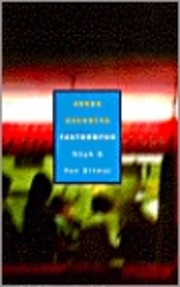

Click on a thumbnail to go to Google Books.
|
Loading... Phantom Painby Arnon Grunberg
 No current Talk conversations about this book.  Deutsche Version dürfte relativ nah am Original übersetzt sein, und wenn das irgendwie bestätigt werden kann, dann kann ich getrost behaupten ich habe den Schreibstil gemocht. Inzwischen beschränke mich auf die Übersetzung, sie ist gut gelungen. Das Leben des Autors wird von seinem Sohn durch seine Erzählung erzählt. Sein Leben ist verwirrt, also menschlich, der Autor leidensfähig und relativ aufmerksam, sensibel und charmant egozentrisch zugleich und scheinbar attraktiv, zumindest für Frauen. An Frauen mach er sein Leben fest, hangelt sich durch, und träumt von einem überzeugend gelungenem Meisterwerk. Der Welt gegenüber ist er unkonventionell halbverschlossen und gleichzeitig gierig nach Aufmerksamkeit - ein Autor halt. Arnon Grünberg gelingt es gut (vermutlich, s.o.) die Sprache des Autors einzigartig zu machen, und der Leser kann die Atmosphäre, die Ideen und die Dialoge ganz gut aufnehmen und genießen. Mein Lieblingszitat aus dem Buch: "Wenn man Glück nicht erwarten darf, muß man sich wenigstens daran erinnern." How fair is it to judge a book according to how memorable it is? Here is a book I read last year, and forgot to review at the time. Since then I have entirely forgotten it. Even the back cover fails to remind me. It has vanished from my memory, and to revive it I would have to start reading the book again. And even then, how far would I have to read before I remembered? A page? Ten pages? Half the book? And what kind of memory would I retrieve? A cloudy thought about how I felt when I finished the book? Some particular scene, an insignificant detail or phrase? What comprises an adequate memory of a book? I don't read a lot of fiction by some people's standards; I try to read a book a week. That means this book is now buried by at least fifty, and possibly hundreds, of books I have read since then. I will never remember it, and -- the painful truth of the marketplace -- now I judge the book because it has failed to stay in my memory. The editor of "Poetry" once told me he reads 60,000 poems a year. In my job, I see about that many images (paintings, visual artworks). By comparison I only read 50 or so novels every year. There isn't that much competition, and a good novel really should be able to stay in my mind, even faintly. This one did not. no reviews | add a review
Awards
Once a literary novelist of some respectability, now brought low by the double insult of obscurity and crippling debt, Robert G. Mehlman is a man in need of money and recognition, fast. It is, of course, to cookery writing that he turns. A practised decadent, a habitual spendthrift and a serial womaniser, he has, ostensibly, all the right qualities. But the path to fame is never a smooth one. Phantom Pain consists largely of the bitterly funny but unpublished manuscript of Mehlman's autobiography. In it, he tells the parallel stories of his decaying marriage and his puzzling affair with a woman he meets by chance and who accompanies him on the road. Their journey takes them on a chaffeur-driven, midnight run from New York to Atlantic City where they gamble away most of Mehlman's remaining funds and then north, to Albany, where his unlikely salvation, and the inspiration for his book Polish-Jewish Cuisine in 69 Recipes, lie. Framed by a son's account of his famous father, this novel-within-a-novel is a hilariously black account of a writer's fall and his subsequent rise. Phantom Pain has all the characteristic mixture of slapstick and dark despair that has made Arnon Grunberg one of the most interesting, certainly the funniest, and arguably the best Dutch writer working today. No library descriptions found. |
Current DiscussionsNonePopular covers
 Google Books — Loading... Google Books — Loading...GenresMelvil Decimal System (DDC)839.31364Literature German literature and literatures of related languages Other Germanic literatures Netherlandish literatures Dutch Dutch fiction 20th Century 1945-1999LC ClassificationRatingAverage: (3.1) (3.1)
Is this you?Become a LibraryThing Author. |
||||||||||||||||||||||||||||||||||||||||||||||||||||||||||||||||||||||||||||||||||||||||||||||||||||||||||||||||||||||||